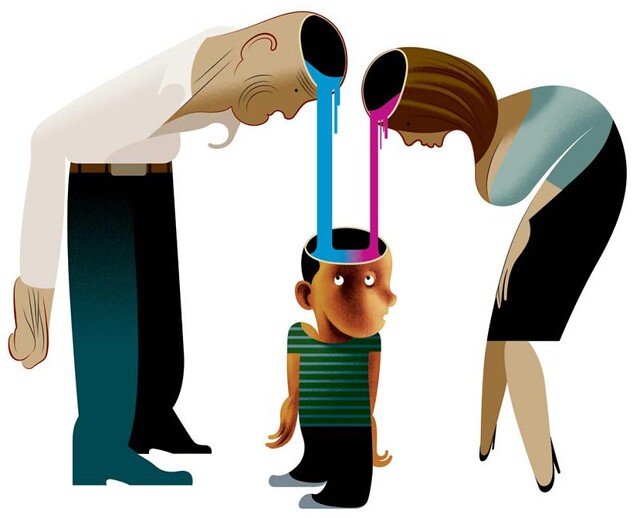How we are in the world is hugely influenced by what happened to us in the past. The most important influences on our lives are usually our parents, especially in the first seven years of our life.
As young, impressionable children, we are in thrall to these god-like figures. Consciously or otherwise, our parents show us how to behave, what is ‘right and wrong’ and, to a large extent, they shape who we are. As vulnerable and relatively helpless children, we want to be liked, accepted and loved. So we adapt our behaviours to gain the approval of our caregivers and to ‘fit in’ – this is known as ‘conditioning’.
However, the behavioural adaptations we made in order to survive childhood often do not serve us as adults. Problems arise in our relationships with others and in how we treat ourselves. At this point we might blame all of our problems on our early caregivers – after all, it was them who effectively forced us to behave in these unhelpful ways!
But how much can we blame on our parents and to what degree must we be accountable for our choices as adults? How can we bring our unconscious patterns into our awareness and break the inter-generational chain of trauma?
What follows is the story of Billy and his family. It illustrates how impactful our parents are upon us and how this can result in inter-generational trauma, repeated behaviour patterns and tragedy. It also shows that, with the enough will and the right support, we can transform ourselves through empowerment and accountability.
THE STORY OF BILLY – childhood trauma, repeating patterns, tragedy, accountability and healing
How Billy learned to be ‘good’…and how he suffered as an adult
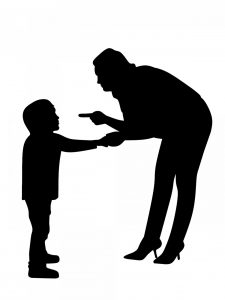 Billy was brought up by his single mother, who was a very strict, critical and perfectionistic parent. She saw ‘being quiet and not making a fuss’ as ‘good’ behaviour. She deemed noisy play and crying to be ‘bad’ and, therefore, punishable behaviours. If ever he failed to meet her high standards of behaviour, she would abuse him verbally, physically and emotionally. And if he complained, his Mum would become terrifyingly angry. Billy lived in fear of his Mum’s wrath, disapproval and brutal punishments. He learned to repress his true self in order to keep her temper in check.
Billy was brought up by his single mother, who was a very strict, critical and perfectionistic parent. She saw ‘being quiet and not making a fuss’ as ‘good’ behaviour. She deemed noisy play and crying to be ‘bad’ and, therefore, punishable behaviours. If ever he failed to meet her high standards of behaviour, she would abuse him verbally, physically and emotionally. And if he complained, his Mum would become terrifyingly angry. Billy lived in fear of his Mum’s wrath, disapproval and brutal punishments. He learned to repress his true self in order to keep her temper in check.
These adaptive behaviours helped Billy to stay safe and feel loved in childhood. However, in adulthood, Billy found himself being a people-pleaser. He was uncomfortable with conflict and feared authority figures such as his boss at work. He always put others’ needs ahead of his own and had difficulty maintaining healthy boundaries. Just like in childhood, he feared expressing his emotions – especially anger – in case others rejected or disapproved of him. His creative, playful side was repressed and he had little joy in his life. He was a perfectionist, always seeking approval and trying to avoid the kind of criticism he used to endure from his Mum.
 Billy worked incredibly hard and with great precision but never achieved his potential. The immense pressure he put on himself to please others was a source of constant stress. Eventually, he got burnt out; he was utterly exhausted, experienced anxiety disorders and numerous physical ailments. In repressing his true self, he struggled to find a sense of identity or purpose. He became severely depressed and attempted to escape his pain through self-harming behaviours, including binge-eating, excessive video-gaming, overworking and abusing alcohol and other drugs.
Billy worked incredibly hard and with great precision but never achieved his potential. The immense pressure he put on himself to please others was a source of constant stress. Eventually, he got burnt out; he was utterly exhausted, experienced anxiety disorders and numerous physical ailments. In repressing his true self, he struggled to find a sense of identity or purpose. He became severely depressed and attempted to escape his pain through self-harming behaviours, including binge-eating, excessive video-gaming, overworking and abusing alcohol and other drugs.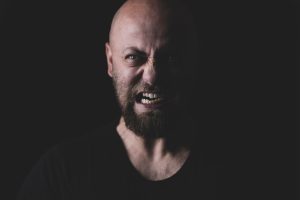
The anger he had repressed all his life leaked out in inappropriate ways. Firstly, he turned it upon his wife, who endured it for many years and bore him three children before leaving him for another man. Billy then projected has anger onto his three children, repeating the strict, critical parenting style he had experienced as a child…
The impact of Billy’s parenting on his children
 Billy’s eldest son, Alex, filled his life from morning until night, seven days a week, 365 days a year. His motto was ‘work hard, play hard.’ He got an excellent degree and landed a lucrative job in the City. Every weekday morning, he would push himself hard in the gym before embarking on a day of meetings with potential clients, cleverly signing up many of them with his persuasive banter and personable smile. Several times each week he would indulge in long, cocaine-fuelled nights with colleagues or clients, often ending up having one-night stands or sleeping with a prostitute. At weekends he would play online games until his eyes and head were sore, using caffeine to keep him awake into the early hours. Alex had no meaningful relationships – no partner, no real friends. And he ‘didn’t really do’ emotions – he just kept himself busy and avoided ‘dwelling upon’ his painful past. Alex struggled to maintain his gruelling routine and sought progressively harder drugs in order to ‘keep going.’ Tragically, he died at the aged of just 29, due to a combination of a drugs
Billy’s eldest son, Alex, filled his life from morning until night, seven days a week, 365 days a year. His motto was ‘work hard, play hard.’ He got an excellent degree and landed a lucrative job in the City. Every weekday morning, he would push himself hard in the gym before embarking on a day of meetings with potential clients, cleverly signing up many of them with his persuasive banter and personable smile. Several times each week he would indulge in long, cocaine-fuelled nights with colleagues or clients, often ending up having one-night stands or sleeping with a prostitute. At weekends he would play online games until his eyes and head were sore, using caffeine to keep him awake into the early hours. Alex had no meaningful relationships – no partner, no real friends. And he ‘didn’t really do’ emotions – he just kept himself busy and avoided ‘dwelling upon’ his painful past. Alex struggled to maintain his gruelling routine and sought progressively harder drugs in order to ‘keep going.’ Tragically, he died at the aged of just 29, due to a combination of a drugs 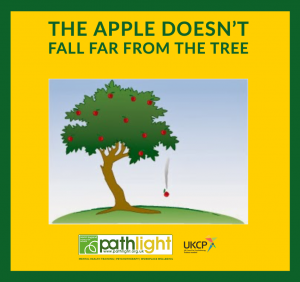 overdose and heart complications.
overdose and heart complications.
Billy’s middle child, William Jnr, came to fear his father’s anger and disapproval. He fell into line, being a ‘good boy’, just like Billy had done as a child. William’s life played out like an uncanny carbon copy of his father’s history. The patterns of people-pleasing, perfectionism, avoidance of conflict and issues with authority and anger were virtually identical. He also experienced the same combination of mental and physical health issues. This ultimately led to him seeking GP support when he collapsed with exhaustion at the tender age of 27…just two weeks before his older brother died.
Roxy was the youngest of Billy’s three children. She rebelled against her Dad’s parenting, refusing to allow herself to be moulded into a ‘mini-me’. They raged at one another throughout her adolescence. Billy’s response to her ‘insubordination’ was to subject her to a barrage of emotional and physical abuse, calling her a ‘lazy, disrespectful, good-for-nothing lout’. He would regularly taunt her, comparing her unfavourably to her ‘good, hard-working brothers’. Roxy rejected her father’s work ethic and ‘old-fashioned’ values; she was a free spirit who wanted to live in joy, ease and creativity. Every time she made a decision, she imagined what her Dad would do…and always chose the opposite, even if doing so caused distress. She left home as soon as she could and travelled around Europe. She spent a few seasons working on organic farms in France, then moved on to a church restoration project in the Spanish Pyrenees.  The last Billy heard from his daughter was a series of text messages she sent whilst in Spain. In them, Roxy explained that, although this was not what she really wanted to do with her life, ‘it was better than slaving away in an office in a meaningless job being bossed around by a man in a suit’. The rest of the messages were an angry assault on her Dad – criticising how badly he had treated her and his whole lifestyle, which she wanted no further part of. She then blocked his number, preventing any further contact.
The last Billy heard from his daughter was a series of text messages she sent whilst in Spain. In them, Roxy explained that, although this was not what she really wanted to do with her life, ‘it was better than slaving away in an office in a meaningless job being bossed around by a man in a suit’. The rest of the messages were an angry assault on her Dad – criticising how badly he had treated her and his whole lifestyle, which she wanted no further part of. She then blocked his number, preventing any further contact.
Billy reaches crisis point…and reaches out for help
Billy became overwhelmed by his chronic mental, emotional, physical and spiritual dis-ease. At the age of 42, he attempted to take his own life.  He clinically ‘died’ for several minutes and was resuscitated in hospital. He struggled on for a few more years before finally accepting that he needed to change…and he needed help. His GP signed him off work, prescribed medication to help with his anxiety and depression and encouraged him to spend time walking in nature regularly.
He clinically ‘died’ for several minutes and was resuscitated in hospital. He struggled on for a few more years before finally accepting that he needed to change…and he needed help. His GP signed him off work, prescribed medication to help with his anxiety and depression and encouraged him to spend time walking in nature regularly.
Billy’s GP also referred him for six sessions of Cognitive Behaviour Therapy, which helped him think about his behaviours in a different way. The following year, Billy started weekly psychotherapy; he didn’t get on with the first therapist but stayed with the second for over four years. During that time, he worked through the wounds of his childhood, with the skilful support and safe space offered by his compassionate, non-judgemental therapist. Together, they brought much of Billy’s unconscious material into consciousness.
Billy’s past is laid to rest…
During this time, Billy came to understand the huge influence that his critical, demanding mother had upon his developing psyche as a young boy. He acknowledged how he had adapted his behaviours as a survival mechanism, acting through fear to avoid his Mum’s anger and to gain her conditional love.
He joined the dots between his childhood traumas and the chronic issues in his adult life. He saw how his childhood coping strategies had become maladaptive and had cost him his mental, physical, emotional and spiritual health…along with many relationships. He expressed his grief, sadness, regret, frustration, disgust and fears…and learned how to safely express his anger.
He reconnected with his inner child. He took his share of the responsibility for his failed marriage and his failure to reach his potential at work. And, crucially, he recognised how he had replicated his Mum’s parenting, reconstellating the wounds he had suffered in his own children.
 Although his time in therapy was often painful, it was also transformational, enlightening, empowering and, at times, joyous. Alongside spiritual practices like meditation and journaling, Billy found compassion, acceptance and forgiveness – for his Mum (and her ancestors), his ex-wife, his children…and himself. He saw how trauma and unhelpful behaviours repeated through the generations like a toxic, psychic cord. He worked through his guilt and came to the realisation that ‘everyone is guilty but nobody is to blame’ – everyone does their best with the tools they have available at the time…and we all fail in some way because of our conditioning, which in itself was a response to our parents’ conditioning.
Although his time in therapy was often painful, it was also transformational, enlightening, empowering and, at times, joyous. Alongside spiritual practices like meditation and journaling, Billy found compassion, acceptance and forgiveness – for his Mum (and her ancestors), his ex-wife, his children…and himself. He saw how trauma and unhelpful behaviours repeated through the generations like a toxic, psychic cord. He worked through his guilt and came to the realisation that ‘everyone is guilty but nobody is to blame’ – everyone does their best with the tools they have available at the time…and we all fail in some way because of our conditioning, which in itself was a response to our parents’ conditioning.
…and he becomes accountable for his present and future
But that was the past. He knew that his domineering mother had been a huge influence on him, from his birth right up until the point that he brought all of this material into consciousness. The past had been present in all of Billy’s behaviours and decisions for decades. But now Billy had to take responsibility for his present and his future. He could now make choices from a position of greater conscious awareness…and he had to become accountable for his choices from the position of his adult psyche.
Inheriting unhelpful behaviour patterns due to our upbringing is virtually inevitable. However, this does not excuse adults like Billy from being responsible for their actions. Billy found it possible to make peace with the past and engage in more conscious, authentic and positive behaviours. He did this through a four-step process of transformation:
- Awareness of his reality and need for change;
- Expression of his repressed emotions in a safe way;
- Compassion, acceptance, forgiveness and unconditional love;…all of which cleared a space for him to practise
- New behaviours.
In his fifties, Billy retrained to be…a psychotherapist! He began to live life true to his soul purpose. He found liberation and empowerment in living authentically, expressing his thoughts and emotions in a calm and congruent way. In supporting others towards healing with his approach of unconditional love and acceptance, he found his calling. And, by changing his behaviours, he broke away from the conditioned patterns that had probably been at play in his family for generations.
‘We do not solve these problems…our task is to outgrow their influence.’
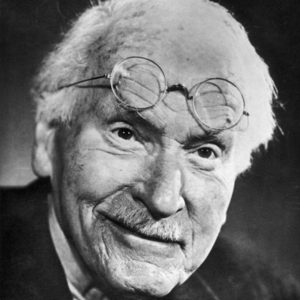
Today, Billy is no saintly figure! He still has moments where he criticises others. He still has thoughts of avoiding conflict rather than expressing his needs. Regardless of how much therapy we have, we cannot surgically remove our history like a tumour. Everything that has ever happened to us is stored somewhere within our being, with the potential to be triggered at any moment. As the psychoanalyst Carl Jung said, “We do not solve these problems, because they are part of us…our task is to outgrow their influence.” So, our task is to recognise our unhelpful patterns sooner, pull ourselves out of them sooner, cause others less hurt and, when we do wound others, make swifter and fuller reparations. For Jung, this approach of living our own, authentic lives, this process of ‘individuation’, is the key task facing us in the second half of our lives.
The three ways we tend to respond to our parenting
As the psychoanalyst, James Hillman, says:
“We all have with us the internalised models of the lives that were lived before us, and there’s a strong tendency for folks to repeat those models.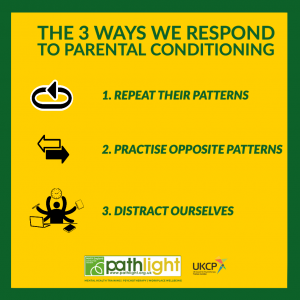
So the first tendency is, in the face of these influences, to repeat them [like Billy’s middle child, William]. Therefore, you see patterns running through the generations.
Second is to run from them [like Billy’s daughter, Roxy]. Anytime a person says, well, I don’t want to be like my mother, or I don’t want to live my father’s life, we’re still being governed by that. We’re still saying, “I want to be not that,” and yet that’s still playing a role.
Or thirdly, maybe we’re out there unconsciously dealing with this in a life of distraction, a life of busyness, a life of addiction—we’re not uninfluenced by these forces [like Billy’s younger son, Alex].”
Who is Billy?
Billy is an amalgam of several people. Much of his story is based upon my own personal experiences, combined with elements of some of my psychotherapy clients and a sprinkling of creative licence. Some details have been changed in order to protect client confidentiality.
Billy’s tale follows a very common pattern. The story is of inter-generational traumas and adaptive behaviours that become maladaptive in adulthood, leading to life crises. Given the right conditions, such crises can be the springboard that results in enhanced awareness, expression, acceptance, new behaviours and healing.
The first condition is for the individual to be ready, willing and able to work through their historic and unconscious material and embrace new, more conscious, loving and authentic ways of being.
The second condition is to have the right kind of support during that journey. This can take many forms, including a suitable psychotherapist, a personal/spiritual development programme such as The Hoffman Process or an appropriate support group. Alongside that external support, the individual can support themselves by maintaining holistic practices that promote positive wellbeing and enhanced awareness. These can include meditation, mindful movement, yoga and journaling.
Further information and support
This blog was inspired by a Sounds True podcast interview with the Jungian Analyst, James Hollis:
https://resources.soundstrue.com/transcript/what-is-wanting-to-find-expression-through-you/
For information on how Pathlight can support you, your family or your organisation around mental health, relationships, workplace wellbeing and more, please get in touch:
- Click here to sign up to Pathlight’s e-newsletter for occasional updates on our services, resources to support mental health & wellbeing and more.
- Visit our website or email us for details of our services
- Mental Health First Aid training
- Workplace wellbeing programmes
- Coaching for individuals, families and teams
- Webinars for individuals and organisations



For more information on this blog post, interviews or services provided by Pathlight Ltd, please email Paul: info@pathlight.org.uk
